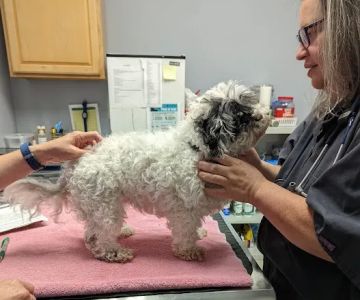How to Manage Pets with Food-Related IBS: A Guide for Pet Owners
Managing a pet with food-related irritable bowel syndrome (IBS) can be challenging, but with the right approach, you can help improve your pet’s quality of life. IBS in pets often leads to uncomfortable digestive issues like diarrhea, vomiting, and bloating, which can make feeding and care seem difficult. In this article, we will discuss the symptoms of IBS, the causes behind it, and how you can help your pet manage this condition effectively.
Understanding IBS in Pets
Just like humans, pets can suffer from IBS, which is a condition affecting the gastrointestinal tract. It can lead to inflammation, irregular bowel movements, and pain in the abdomen. The exact cause of IBS in pets is not fully understood, but food allergies or sensitivities often play a major role in triggering the condition. Common symptoms of IBS in pets include:
- Frequent diarrhea or constipation
- Vomiting or nausea
- Bloating or distended stomach
- Changes in appetite
- Fatigue or lethargy
If you notice any of these signs in your pet, it’s essential to consult with a veterinarian to rule out other conditions and confirm IBS as the diagnosis.
1. Identifying Food Triggers
One of the most important aspects of managing IBS in pets is identifying the food that triggers the symptoms. Common culprits include:
- High-fat foods
- Processed ingredients
- Dairy products
- Grain-based foods like corn or wheat
- Artificial additives or preservatives
Working with a veterinarian to create a food elimination plan can help pinpoint the specific foods that may be aggravating your pet’s digestive system. Keep a food journal and note any symptoms after feeding different meals to track patterns more effectively.
2. Switching to a Sensitive Diet
Once you’ve identified food triggers, switching your pet to a sensitive stomach diet is often recommended. Many pet food brands now offer formulas specifically designed for pets with digestive issues, such as:
- Limited ingredient diets (LID) that focus on a single protein source and easily digestible carbohydrates
- High-quality, natural ingredients with minimal additives
- Grain-free options for pets with grain sensitivities
- Probiotic-rich foods to support healthy gut flora
These diets can help reduce inflammation and improve digestive health, making it easier for your pet’s system to process their food.
Treating IBS Symptoms in Pets
Aside from dietary changes, there are other treatment options that can help manage IBS symptoms and improve your pet’s digestive health:
3. Probiotics and Supplements
Probiotics are beneficial bacteria that can help restore balance to the gut and improve digestion. Many pet owners find that adding a high-quality probiotic supplement to their pet’s diet can reduce symptoms like diarrhea and bloating. Other helpful supplements include:
- Digestive enzymes
- Fiber supplements to regulate bowel movements
- Omega-3 fatty acids to reduce inflammation
Consult with your veterinarian to determine which supplements would work best for your pet’s specific condition.
4. Stress Management
Stress is another factor that can exacerbate IBS symptoms in pets. Changes in routine, environmental stressors, or travel can all lead to digestive upset. To help your pet manage stress, try the following:
- Provide a consistent feeding schedule
- Ensure a calm and safe environment, especially during mealtimes
- Consider using pheromone diffusers or calming products
- Engage your pet in regular exercise to release energy
Maintaining a calm, predictable environment can make a significant difference in preventing stress-induced flare-ups of IBS.
5. Veterinary Care and Medications
In some cases, your veterinarian may recommend medications to help manage IBS. These can include:
- Antispasmodic medications to reduce cramping
- Anti-inflammatory drugs to calm the digestive system
- Antibiotics to treat any underlying infections that may be present
It’s important to follow your vet’s instructions closely when administering medication, as they will provide the best guidance based on your pet’s individual needs.
Real-Life Example: How One Pet Overcame IBS
Meet Bella, a 5-year-old Golden Retriever who had been suffering from constant diarrhea and bloating. Her owners, who were concerned about her health, took her to the vet. After a thorough examination, they discovered that Bella had IBS triggered by certain grains and additives in her food. With the help of a tailored diet plan, probiotics, and stress management strategies, Bella’s condition improved significantly within a few weeks. She is now back to her happy, energetic self, and her owners are grateful for the professional guidance they received.
Preventing IBS Flare-Ups: Ongoing Care for Your Pet
Managing IBS is an ongoing process, but with the right approach, your pet can live a happy and comfortable life. Regular check-ups with your veterinarian, careful food selection, and a consistent routine can keep IBS symptoms under control. Remember, your pet relies on you to provide the best care possible.
If you're looking for more information on managing food-related IBS or need personalized advice, visit Hidden Brook Veterinary for expert guidance and tailored recommendations.












